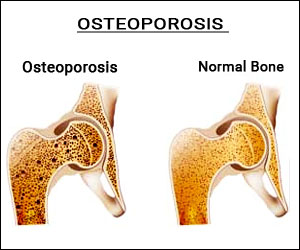- Home
- Editorial
- News
- Practice Guidelines
- Anesthesiology Guidelines
- Cancer Guidelines
- Cardiac Sciences Guidelines
- Critical Care Guidelines
- Dentistry Guidelines
- Dermatology Guidelines
- Diabetes and Endo Guidelines
- Diagnostics Guidelines
- ENT Guidelines
- Featured Practice Guidelines
- Gastroenterology Guidelines
- Geriatrics Guidelines
- Medicine Guidelines
- Nephrology Guidelines
- Neurosciences Guidelines
- Obs and Gynae Guidelines
- Ophthalmology Guidelines
- Orthopaedics Guidelines
- Paediatrics Guidelines
- Psychiatry Guidelines
- Pulmonology Guidelines
- Radiology Guidelines
- Surgery Guidelines
- Urology Guidelines
Family history of diabetes decreases chances of osteoporosis in postmenopausal women, finds study

Chinese researchers have found in a study that a history of first-degree family members with diabetes is linked to increased BMD as well as to insulin resistance. Results are published online in Menopause, the journal of The North American Menopause Society (NAMS).
The association between type 2 diabetes and increased fracture risk is well documented. However, little was known about the possible effect of family history of diabetes on bone mineral density (BMD).
Because patients with type 2 diabetes are at an increased risk of fracture, understanding the early pathophysiology of altered BMD could be critical in the development of preventive strategies for diabetic osteoporosis. Although strong evidence has revealed normal to high BMD in most patients with type 2 diabetes, no data have been published, to date, that demonstrate whether BMD is altered in persons with a first-degree family history of diabetes.
In this new study involving nearly 900 normoglycemic postmenopausal women, it was found that the BMD of the lumbar spine and femoral neck was significantly higher in participants with a first-degree family history of diabetes than in those without such history, even in women with normal blood sugar levels. These same participants additionally showed increased insulin resistance and hyperinsulinemia.
Findings were published in the article "Association of bone mineral density with a first-degree family history of diabetes in normoglycemic postmenopausal women."
"This study shows an association between a family history of diabetes and increased bone density in postmenopausal women. This finding may be related to higher insulin levels in these women with a hereditary predisposition to diabetes because insulin has a bone-building effect. Although this sounds like good news, these women are at increased risk for developing diabetes, which is associated with skeletal fragility and increased fracture risk," says Dr. Stephanie Faubion, NAMS medical director.

Disclaimer: This site is primarily intended for healthcare professionals. Any content/information on this website does not replace the advice of medical and/or health professionals and should not be construed as medical/diagnostic advice/endorsement or prescription. Use of this site is subject to our terms of use, privacy policy, advertisement policy. © 2020 Minerva Medical Treatment Pvt Ltd